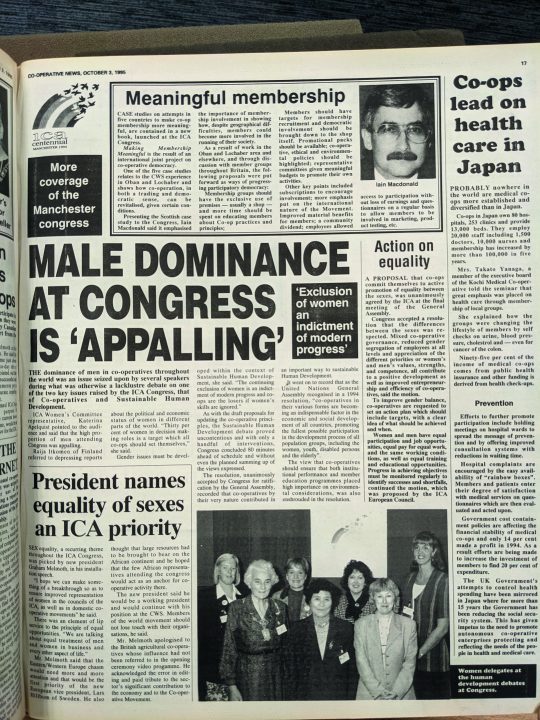In early December, the global co-operative community will be gathering in Seoul, Republic of Korea, and online, for the 33rd World Cooperative Congress, organised by the International Cooperative Alliance.
International Congresses are very special occasions for the movement; the first was held in 1895, in London, as a chance to learn, celebrate and communicate what different organisations in different countries were doing, and how they were evolving. Since then, they have been held regularly, looking at how to encourage relations between co-ops, and how to propagate co-operative ideas.
One of the main outputs of the 1895 Congress was the establishment of the ICA – which today has in its membership 318 organisations from 110 countries.
“Co-operators have always been fascinated by what other co-operators are doing and what they can learn from it,” said Gillian Lonergan, retired co-operative librarian, in an interview to mark the 125th anniversary of the ICA last year.
“[In the late 19th century] co-operators themselves were visiting other co-operatives and exchanging good ideas and good practice. But to have an international conference was a big thing, and people were getting really excited about it from around 1890 onwards. In 1895, people came together from so many different places – from America, India and across Europe – who wanted to get together and learn from each other. And I think it was everything that people had hoped that it would be.”
Related: Preview of the upcoming World Congress
She added: “The first Congress is fascinating because even in the verbatim report you get a feel for the excitement. People were spending five days together, talking and learning. Some days, they actually didn’t come to an agreement about the topic on the allocated day, so debates continued the next morning until a consensus was reached. Everybody was listened to. All views were welcomed and everybody got the opportunity to put forward their ideas, and to completely disagree with somebody else and use it as a start of another debate.”
Around the world, co-operatives are often established because there’s an identified problem that needs to be addressed. “People the whole world over learn from each other, and adapt … One of the several goals at the very first Congress was to manage the common co-operative principles, alongside knowledge sharing and commercial links.”
The Congress in Co-op News
That first Congress took place 24 years after the first issue of Co-op News was published – and the event was thoroughly covered by the publication, often word for word.
“A large number of English and foreign delegates of co-operative societies of all types met at the society of Arts, Adelphi, London, on Monday last, to take part in the first International Co-operative Congress, under the presidency of the Right Hon. Earl Grey, of Hawick,” the opening report began, before quoting Earl Grey’s speech in full.
“We have met here today, the representatives of different organisations, widely removed in language, but clearly united in aspirations, to take such counsel together to see how far the co-operative principle can be applied to industrial enterprise in our respective countries,” he said.
100 years later, the ICA celebrated its centenary at the 1995 Congress held, like the first, in the UK – but this time in Manchester. Its president was then-secretary of the Co-operative Wholesale Society, Graham Melmoth (who would become CWS CEO the following year, oversee the CWS merger with Co-operative Retail Services in 2000 to form the Co-operative Group and be knighted in 2012, the year he retired as Group CEO).

The coverage from the time includes a call from Alf Morris MP on the role of co-operatives in saving the UK’s health service, notes on environmental issues, gender equality: (“ICA Women’s Committee representative, Katerina Apelquist pointed to the audience and said that the high proportion of men attending Congress was appalling…”), the launch of a case study on meaningful membership by Iain Macdonald – and a plea from the ICA’s communications committee for the wider movement to make greater use of the internet.
A global community
“The ICA has always had the core role of bringing people together,” says Mrs Lonergan. “And this is very important … Co-operation is done in different ways in different places and in different sectors, but we can all learn from each other, and we’re all working in the same direction.”
Now co-operators worldwide are looking forward to the hybrid event in December, postponed twice due to Covid-19, but with a cast of high-profile speakers and panellists, including the ILO’s Guy Ryder and SEWA founder Ela Bhatt.
As part of the preparations for Congress, ICA secretary-general Bruno Roelants travelled to Seoul in September.
“Based on the hospitality I received and the experience I had during my visit, those who are planning to attend the Congress in person can be assured that their visit to Seoul will be a safe, enjoyable and engaging trip,” he said.
“My trip to Seoul confirmed for me that the planning for Congress is proceeding well, and our Korean partners and co-organisers are committed to hosting a successful event.”
As with all previous congresses, Co-op News will be covering this historic event in full. But before we get there, what is Gillian Lonergan’s final message to potential delegates?
“Over the years I have met people who have been to ICA Congresses, and every one of them has come back buzzing with new ideas and the joy of having the opportunity to meet so many different people and learn so much. Make sure that you keep that enthusiasm and open-minded sense of ‘what can I come back with from this?’ and ‘what can I bring to my own country from this?’”